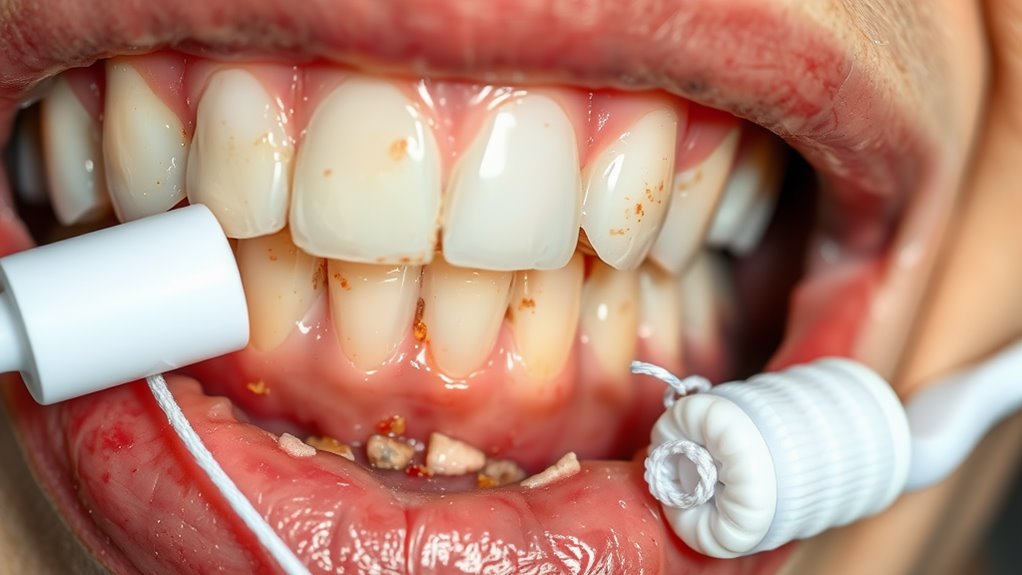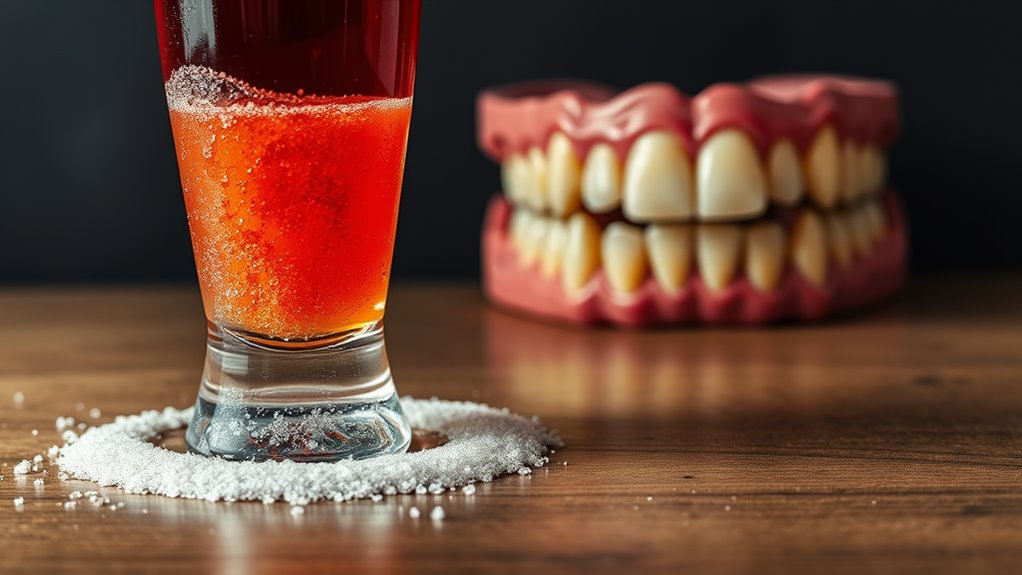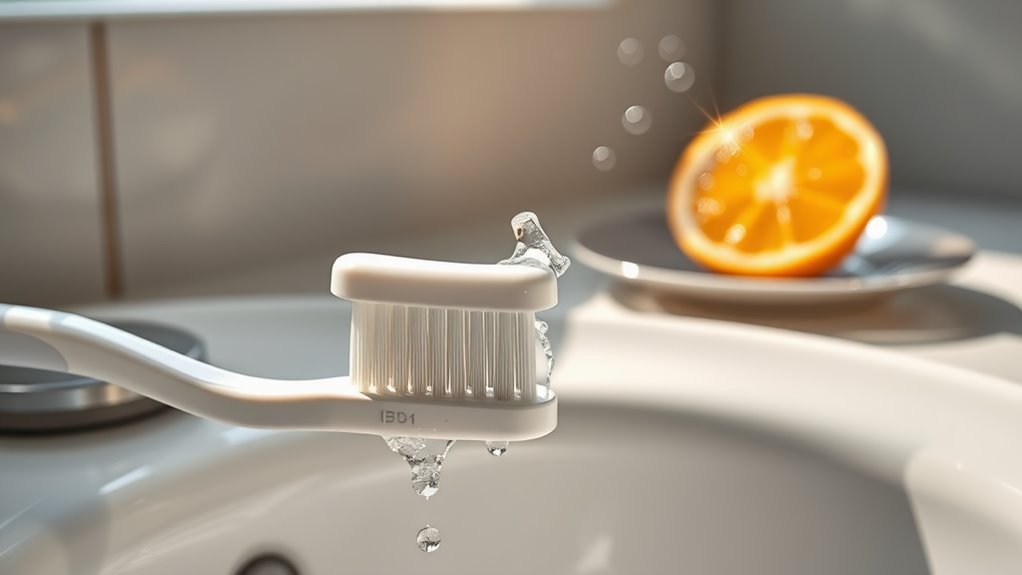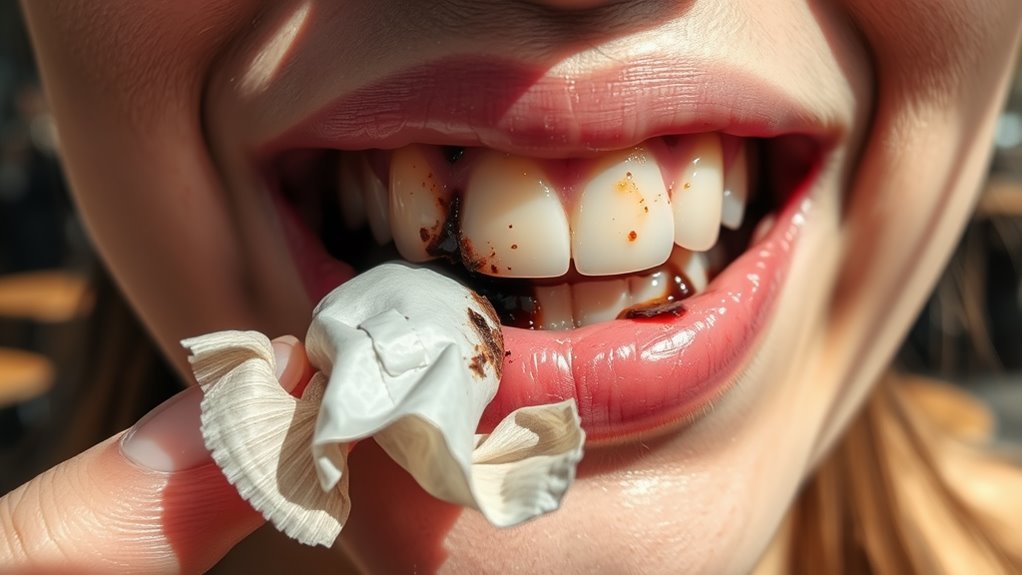What Happens When You Skip Brushing for One Day.
Skipping just one day of brushing your teeth may seem harmless, but it can set off a chain reaction that affects your oral health. Within hours, bacteria start to multiply, leading to plaque buildup and potential gum irritation. This neglect can also result in bad breath and a fuzzy feeling in your mouth. What many don’t realize is that these immediate consequences can have far-reaching implications for your overall health. So, what happens if you let this slide?
Key Takeaways
- Skipping brushing for one day allows food particles and bacteria to accumulate, leading to plaque buildup on teeth and gums.
- Bacteria multiply rapidly, potentially doubling in hours, which can increase the risk of cavities and gum disease.
- Bad breath develops due to the decomposition of food particles and the production of volatile compounds by bacteria.
- Gums may become red and swollen from irritation caused by bacterial accumulation, leading to sensitivity and discomfort.
- Long-term neglect of oral hygiene can result in severe dental issues, including tooth loss and costly dental procedures.
The Initial Effects on Oral Hygiene
Have you ever wondered what happens to your mouth after just one day of skipping brushing?
When you skip brushing, food particles and bacteria linger on your teeth and gums.
You might notice a fuzzy feeling on your teeth, indicating plaque buildup.
Your breath may start to smell unpleasant as bacteria thrive, producing volatile compounds.
Additionally, your gums can become irritated due to the accumulation of plaque and bacteria.
This initial neglect can create a breeding ground for more severe issues if you continue to skip brushing regularly.
In fact, cleaning tongue is often overlooked, which can further exacerbate bad breath and bacteria growth.
It’s clear that even one day of skipping brushing has immediate consequences for your oral hygiene.
Bacterial Growth and Plaque Formation
When you skip brushing for just one day, bacteria in your mouth begin to multiply rapidly. This increase in bacterial presence leads to the formation of plaque, a sticky film that coats your teeth. If left unchecked, this plaque can harden and cause more serious dental issues. Regular brushing and flossing help decrease bacterial buildup, which is essential for maintaining a healthy smile.
Bacteria Multiply Rapidly
Bacteria thrive in the warm, moist environment of your mouth, multiplying rapidly when you skip brushing for just one day.
Within hours, the bacterial population can double, leading to an environment rich in harmful microorganisms.
These bacteria feed on food particles and sugars left on your teeth, producing acids that can erode enamel.
As their numbers grow, they form a biofilm that adheres to your teeth.
This rapid multiplication makes it essential to maintain a consistent oral hygiene routine.
Neglecting to brush even briefly creates ideal conditions for bacterial proliferation, setting the stage for potential dental issues down the line.
Plaque Accumulation Begins
Plaque accumulation begins shortly after you skip brushing, as the biofilm of bacteria adheres more firmly to your teeth.
Within hours, these bacteria produce acids that can erode enamel and promote decay. The layers of plaque thicken, creating a sticky environment that encourages more bacterial growth.
If left untreated, plaque hardens into tartar, which can only be removed by a dental professional. This accumulation can lead to gum inflammation, cavities, and bad breath.
Therefore, even one day without brushing can set off a chain reaction that jeopardizes your oral health, emphasizing the importance of maintaining a consistent dental hygiene routine.
Bad Breath: A Common Consequence
When you skip brushing for just one day, bacteria in your mouth multiply rapidly. Food particles left behind can contribute to this buildup, leading to unpleasant odors. Neglecting oral hygiene can quickly turn into bad breath, a common consequence you mightn’t want to face. Additionally, chronic dry mouth can exacerbate bad breath by allowing odor-causing bacteria to thrive.
Bacteria Growth Increases
Neglecting to brush your teeth for just one day can lead to a significant increase in bacteria growth, which often results in bad breath.
Your mouth naturally harbors bacteria, but without brushing, these microorganisms multiply rapidly. The accumulation of bacteria produces volatile sulfur compounds, which are primarily responsible for unpleasant odors.
This bacterial overgrowth not only affects your breath but can also lead to gum inflammation and dental issues over time.
Food Particles Accumulate
Skipping your daily brushing can lead to an unpleasant buildup of food particles in your mouth. These particles, left unchecked, create a perfect environment for bacteria to thrive.
When food debris remains, it decomposes, releasing volatile sulfur compounds that cause bad breath. Even if you think you’ve rinsed your mouth, small remnants cling to your teeth and gums, promoting odor.
Additionally, this accumulation can lead to plaque formation, which eventually contributes to cavities and gum disease. By neglecting to brush, you’re not just risking bad breath; you’re setting the stage for more significant oral health issues down the line.
Oral Hygiene Neglect
How often do you consider the impact of neglecting your oral hygiene? Skipping just one day can lead to bad breath, a common consequence of inadequate care. Bacteria multiply rapidly, producing unpleasant odors. Understanding this can motivate you to prioritize daily brushing and flossing.
| Consequence | Description |
|---|---|
| Bad Breath | Caused by bacteria and plaque |
| Tooth Decay | Acidic byproducts erode enamel |
| Gum Disease | Inflammation from plaque buildup |
| Overall Health | Linked to heart disease risks |
Don’t underestimate the importance of your daily routine!
Impact on Gum Health
A single day without brushing your teeth can have a noticeable impact on your gum health.
You mightn’t see immediate effects, but your gums can start to suffer.
Here’s what could happen:
- Plaque Buildup: Bacteria thrive, forming plaque that irritates your gums.
- Inflammation: Your gums may become red and swollen, signaling early gum disease.
- Sensitivity: You might experience discomfort or pain when eating certain foods.
- Bad Breath: The bacteria contribute to unpleasant odors, making you self-conscious.
Additionally, ignoring daily oral hygiene can lead to more severe gum issues if not addressed promptly.
Taking care of your gums is crucial for overall oral health, so don’t skip that brush!
Increased Risk of Cavities
When you forgo brushing your teeth for just one day, you elevate your risk of developing cavities significantly.
Bacteria thrive in the mouth, forming a sticky plaque that coats your teeth.
Without brushing, this plaque hardens into tartar, leading to tooth decay.
The acids produced by bacteria in plaque attack tooth enamel, weakening it and creating openings for cavities to form.
Even one day without brushing allows these harmful bacteria to multiply, increasing your chances of dental issues.
Untreated cavities can progress to severe pain and infection, emphasizing the need for regular dental care.
To protect your teeth, brush twice daily and maintain good oral hygiene practices.
Don’t underestimate the importance of consistent dental care.
The Psychological Effects of Neglecting Dental Care
Neglecting dental care doesn’t just leave you vulnerable to physical health problems; it can also impact your mental well-being.
When you skip brushing, you might experience:
- Increased Anxiety: Worrying about bad breath or cavities can heighten stress levels.
- Lower Self-Esteem: Not maintaining your oral hygiene may lead to feelings of embarrassment about your smile.
- Social Withdrawal: You may avoid social interactions, fearing judgment from others.
- Mood Changes: Neglecting dental care can lead to irritability and a negative outlook.
Additionally, taking care of your teeth can help reduce anxiety in social situations, supporting a healthier mental state overall.
Taking care of your teeth is vital not just for your mouth but for your overall mental health.
Long-Term Implications for Oral Health
Skipping brushing for just one day might seem harmless, but over time, the consequences can compound significantly.
Neglecting your oral hygiene fosters plaque buildup, leading to cavities and gum disease.
As bacteria proliferate, you may experience chronic bad breath and increased sensitivity.
Long-term neglect can result in tooth loss and the need for expensive dental procedures.
Additionally, poor oral health has been linked to systemic issues like heart disease and diabetes.
By prioritizing brushing daily, you can maintain not only your smile but also your overall health.
Commit to your dental hygiene to avoid these severe implications in the future.




